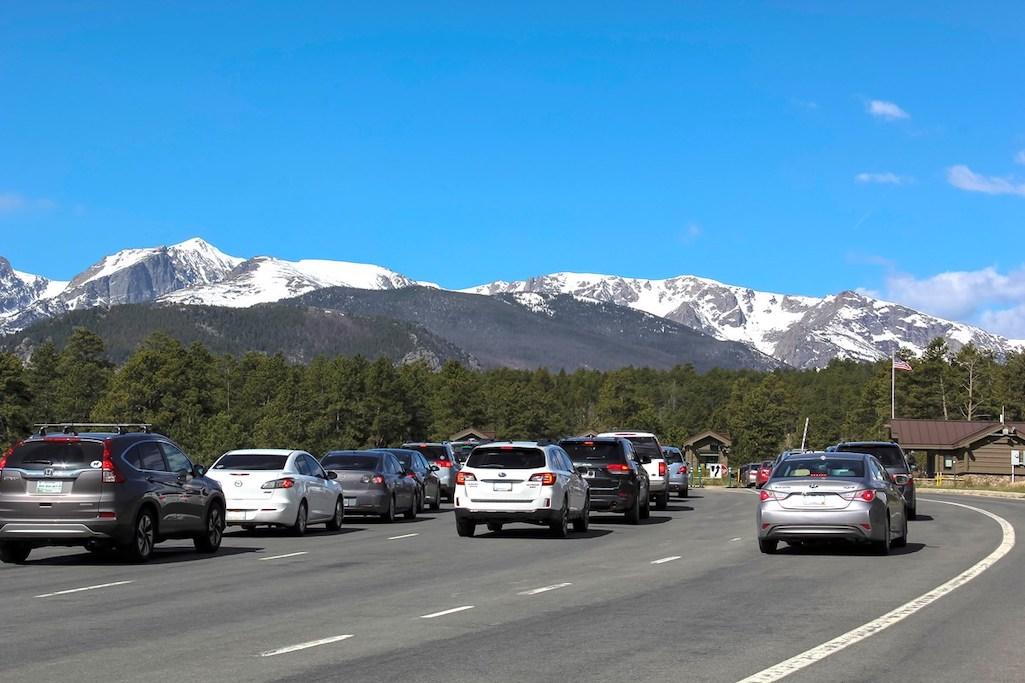
You'll need a ticket to drive into Rocky Mountain National Park this summer/NPS file
Rocky Mountain National Park in Colorado will implement a temporary timed entry permit reservation system beginning on May 28.
The pilot program comes as park staff expect higher visitation this summer and are continuing to manage Covid-19 concerns. Plus, the park could face staffing shortages due to housing, reduced shuttle bus capacity, and residual fire impacts in some areas of the park from last year's historic fires.
There will be two types of reservations available. One permit will be for the Bear Lake Road Corridor, which will include the entire corridor and access to the rest of the park. This reservation period will be from 5 a.m. to 6 p.m. The second permit will be for the rest of Rocky Mountain National Park, excluding the Bear Lake Road corridor. This reservation period will be from 9 a.m. to 3 p.m. Permits issued using the reservation system will allow park visitors to enter the park within two-hour windows of availability. The reservation system will apply to all areas of the park.
The passes will cost $2, the processing fee charged by recreation.gov. You'll also need a park pass for entrance.
Reservations to enter the park will go on sale through www.recreation.gov at 8 a.m. Mountain Daylight Time on Saturday, May 1. Reservations will be available to enter the park from May 28 through June 30. The next release will be on June 1, for the month of July and any remaining days that have not been booked for June.
On July 1, reservations will be available for the month of August and any remaining days that have not been booked for July. On August 1, reservations will be available for the month of September and any remaining days in August that have not been booked.
On September 1, reservations will be available for October and any remaining days in September that have not been booked. Initially, 25 percent of permits will be held and available for purchase the day prior at 5 p.m. through recreation.gov. These are expected to sell out quickly and visitors are encouraged to plan ahead when possible.
This year’s pilot reservation system allows for a greater number of reservations per day than was the case last year. Reservations will be based on approximately 75 percent to 85 percent of the park’s total parking capacity. Last year’s system was based on approximately 60 percent of the park’s total parking capacity. This system spreads use throughout the park to better utilize all parking/trailhead areas. This system will be adaptable to changes in visitation trends and public health concerns.
Last year, after being closed for two months amid the Covid-19 pandemic, Rocky Mountain National Park reopened in late May and was the first national park in the country to implement a temporary timed entry permit system to increase park access while providing the public a reasonable opportunity to comply with health guidelines. That timed entry permit system ended on October 12, 2020.
In 2020, Rocky Mountain National Park was the fourth most-visited national park in the country with a 28 percent increase in visitation in November and a 38 percent increase in visitation in December over those months in 2019.
In February, to protect the health of those who live, work, and visit national parks and National Park Service facilities, and in support of President Biden’s Executive Order on Protecting the Federal Workforce and Requiring Mask-Wearing the NPS implemented a mask requirement for employees, visitors, partners and contractors. At Rocky Mountain National Park, face masks are required in all park buildings and facilities. Masks are also required on NPS-managed lands when physical distancing cannot be maintained, including narrow or busy trails, parking lots, pull-offs and overlooks.
When recreating, park visitors should follow local area and federal health orders, maintain social distance and avoid high-risk outdoor activities. Please do not visit if you are sick or were recently exposed to COVID-19. Park staff will continue to monitor all park functions to ensure that visitors adhere to CDC guidance for mitigating risks associated with the transmission of COVID-19 and take any additional steps necessary to protect public health.
Keep your distance. Give others plenty of room whether you are on a trail or in a parking lot. If staying at least six feet from others is not possible, a mask is required. Face masks are required in all park buildings and facilities.
Keep it with you. If you brought it, take it with you. Trash pickup and restroom facilities may be limited in many park areas. Follow Leave No Trace principles.
Know your limits. Rocky Mountain National Park is one of the busiest search and rescue parks in the country. Many of these incidents could be avoided with visitors planning and making responsible decisions.
Details and updates on park operations and services will continue to be posted on the park’s official website at www.nps.gov/romo through social media @RockyNPS or call the park’s Information Office at (970) 586-1206.



Add comment